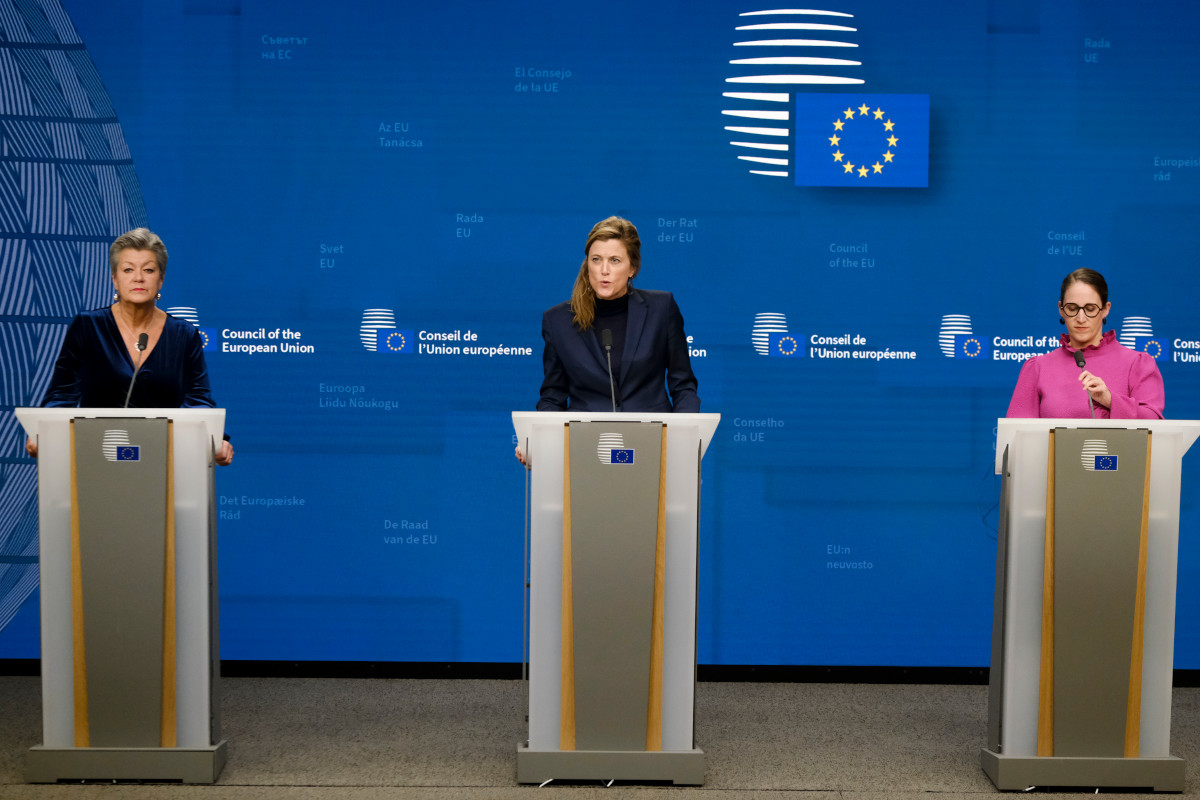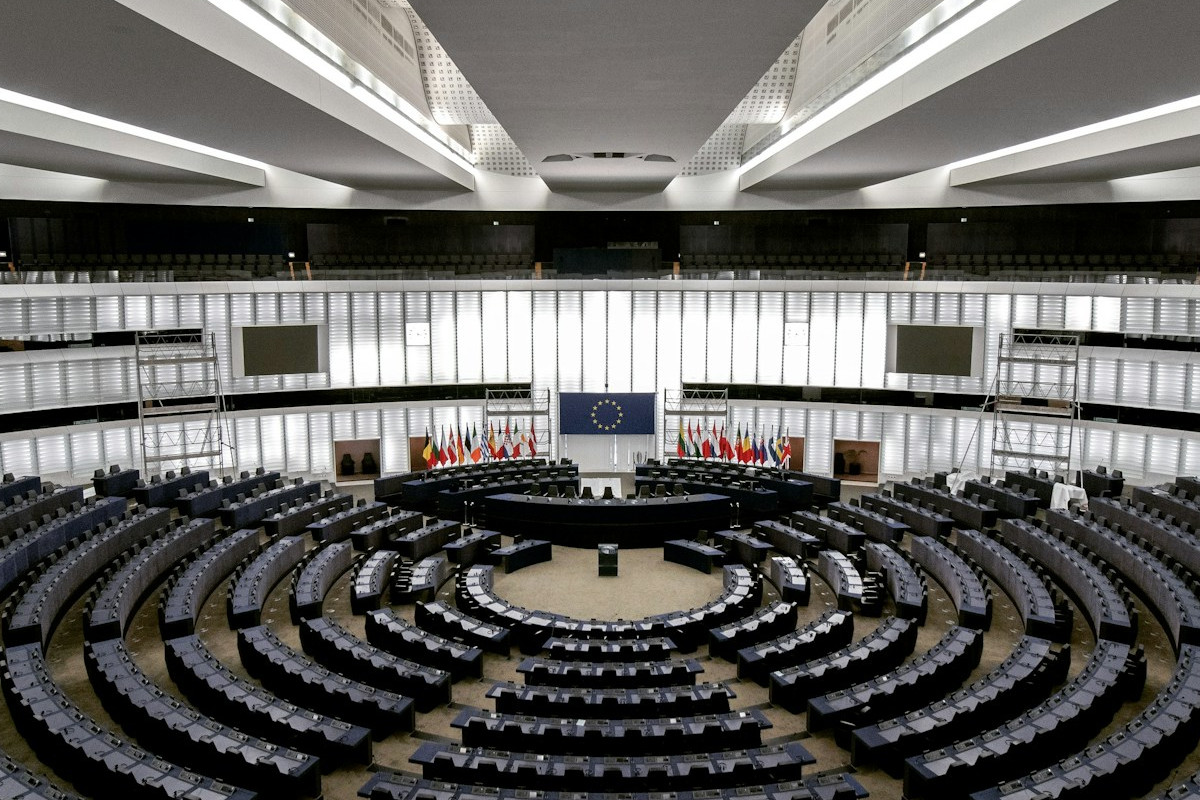EU: Council eyes role in “operationalising” the Pact on Migration and Asylum
Topic
Country/Region
25 April 2024
“The effectiveness of this new legal framework hinges on its successful implementation. This will require the adoption and application of regulatory adjustments at national level, the development or enhancement of equipment and infrastructure, the implementation of new systems, processes and procedures, reinforced coordination at national and EU level, and increased operational support and financial allocation.”
Support our work: become a Friend of Statewatch from as little as £1/€1 per month.

Ylva Johansson (European Commissioner for Home Affairs), Annelies Verlinden (Belgium interior minister) and Nicole de Moor (Belgian State Secretary for Asylum and Migration) at a press conference of the EU Justice and Home Affairs Council, March 2024. Image: European Union
A discussion paper (pdf) circulated by the Belgian Council Presidency to the Council’s Strategic Committee on Immigration, Frontiers and Asylum (SCIFA) at the beginning of the month calls for the member states to coordinate closely on the implementation of the Pact.
The Presidency notes that “the effective involvement of the Member States and the Council in the process will also be crucial to preserve the positive momentum and enable the new framework to be successfully appropriated at national level.”
What this “success” will mean for migrants and refugees is increased detention, reduced safeguards, increased rejections of asylum applications, the likelihood of increased deaths as people are forced to take ever more dangerous journeys, and an increase in surveillance.
The paper runs through the timeline laid out by the Commission in a March communication (pdf), which foresees the presentation of Common Implementation Plan in June: “This will set the path forward with a roadmap, timeline and milestones for EU and national action,” says the Presidency.
Each member state must then produce its own National Implementation Plan six months after the entry into force of the Pact. The deadline for these plans is therefore likely to be the end of this year.
The Presidency acknowledges the central role of the Commission in implementing the Pact, but notes that “it is essential that the interests of the Member States and the role of the Council are carefully taken into account and reflected in the implementation process.”
The key suggestion for achieving this is for the Council “to keep a general overview of the common implementation and to provide political and strategic guidance,” and the involvement of the Council “including at ministerial level, could further this objective, by encouraging the continued commitment and determination of Member States at political level.”
Civil society organisations, meanwhile, are questioning if and how they will be able to have any influence over the national implementation plans, with the aim of ameliorating some of the worst effects of the Pact.
At a meeting organised by The Left group in the European Parliament last week, representatives of multiple organisations reiterated the need for civil society organisation to be given a say over the national implementation plans, and to seek direct involvement in the human rights monitoring mechanisms foreseen under the Pact.
Whether that will be achieved remains to be seen. In the meantime, the Council, the Commission and the member states will remain firmly in the driving seat.
Three questions are put to national delegations in the Presidency’s paper:
- Do you consider that the building blocks approach as put forward by the Commission is appropriate to guide the Commission’s gap analyses and the development of the Common Implementation Plan? If so, to which extent should these building blocks be detailed in the CIP?
- Do you agree that these building blocks should be completed by a roadmap with a timeline and milestones for EU and national actions in order to constitute the Common Implementation Plan and serve as a framework for developing the National Implementation Plans?
- Do you support the involvement of the Council in the follow-up of the implementation process with a view to maintaining a high level of engagement and providing political and strategic guidance on the process?
The paper was on the agenda for the SCIFA meeting on 10 April, and that discussion was intended to set the scene for a ‘Ministerial Conference on Implementation and Operationalization of EU Pact Asylum and Migration’ taking place in Ghent at the beginning of next week (pdf). The Justice and Home Affairs Council in mid-June will also take up the topic.
Documentation
- Operationalisation and implementation of the Migration and Asylum Pact - Discussion paper (Council doc. 8015/24, LIMITE, 3 April 2024, pdf)
- European Commission communication, Striking a balance on migration: an approach that is both fair and firm (COM(2024) 126 final, 12 March 2024, pdf)
Our work is only possible with your support.
Become a Friend of Statewatch from as little as £1/€1 per month.
Further reading

Hardwiring the externalisation of border control into EU law
EU institutions have almost finalised negotiations on the Pact on Migration and Asylum, with MEPs due to vote on a range of new laws next week. Approval for the measures is almost certain – and when they come into force, they will turn the externalisation of migration and border control into legal obligations.

Migration Pact "will engender a proliferation of human rights violations" and must be rejected
Ahead of Wednesday's final parliamentary vote on the laws that make up the EU's Pact on Migration and Asylum, 161 organisations - including Statewatch - have called on MEPs to vote against the new measures. The statement says that the new laws will create "a system whereby the right to seek asylum in the EU is severely threatened and will engender a proliferation of human rights violations," and should be rejected.

The EU Migration Pact: a dangerous regime of migrant surveillance
The #ProtectNotSurveil coalition, of which Statewatch is a member, has issued a statement condemning "the criminalisation and digital surveillance of migrants" that will be ushered in by the new Pact on Migration and Asylum. The laws that are part of the Pact were given final approval by the European Parliament this afternoon. The statement explains how the new legal framework "will enable and in some cases mandate the deployment of harmful surveillance technologies and practices against migrants," whilst laying the foundations for the expanded use of invasive technologies in the future.
Spotted an error? If you've spotted a problem with this page, just click once to let us know.

